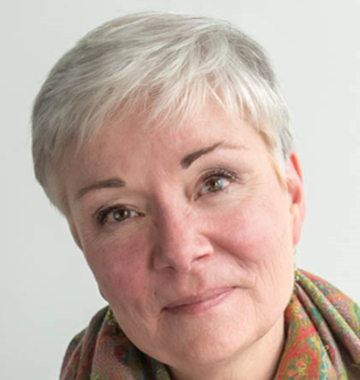Episode 297: Mary Jane Copps

Meet
Mary Jane Copps
Mary Jane Copps’ work is all about inspiring conversations—in sales and customer service. She is currently ranked #1 by Google as a “phone coach” and her conversation skills are being used by over 1,000 companies worldwide.
Our Mission Is To Change The Negative Perception Of Sales People
Our Vision Is A World Where Selling Is A Profession To Be Proud Of
Storytelling is the best way to help someone learn and understand the value of a new concept, product, or service. Mary Jane Copps also believes that it’s a great way to build rapport. In this episode of the Sales Reinvented podcast, Mary Jane shares how a good story is crafted, what makes a great storyteller, and even tells one of her favorite stories. Don’t miss it!
Outline of This Episode
- [0:46] Why is storytelling an important skill to possess?
- [1:35] Is storytelling something that can be learned?
- [2:08] The ingredients of a great story that sells
- [3:26] The attributes of a great storyteller
- [5:03] Improve your storytelling abilities with these resources
- [6:38] Top 3 storytelling dos and top 3 don’ts
- [10:37] The importance of follow up in sales
The ingredients of a great story that sells
What makes for a great story that sells? According to Mary Jane Copps, you need to start with a challenge that is customized to the audience you’re speaking to. The story must include some sort of lesson or challenge that you overcome. Mary Jane points out that there needs to be a hero. The hero may be the product or service—or even you. But storytelling is also a great way for people to get to know you. You can make them laugh. It allows you to build trust. A good story can help someone go, “I should work with this person.”
The attributes of a great storyteller
When you’re telling a story, you need to pace yourself. You need a good tone of voice and delivery to build excitement and trust. You have to customize it to the audience you’re speaking to. You must also be empathetic. It tells the prospect you’ll have empathy and compassion with them. If you’re telling a story about yourself, you must be humble.
Want to improve your storytelling abilities? Be sure to check out the resources below!
Top 3 storytelling dos and top 3 don’ts
What does Mary Jane live by when it comes to storytelling?
- Humor is key. Once people are laughing, you know you have their full attention and that they’re enjoying themselves.
- Allow yourself to be vulnerable as a storyteller. Tell your story truthfully—share successes and the failures you had to overcome. Vulnerability allows you to build a strong foundation of trust.
- Match the story to the audience. You shouldn’t tell a story for the sake of telling a story. Instead, it should match what is important to the prospect or customer.
- Don’t be boastful. When you’re selling, you have to share the success you’ve realized with other clients. It’s an important aspect of growing a business and creating revenue. However, do it humbly.
- Don’t make your story a novel. When you go to networking events or cocktail parties, no one wants to get stuck with the person who is telling stories and never stops. Make them pithy, easy to listen to, and don’t take over the entire conversation.
- Don’t go off-topic. Don’t throw in a story that you enjoy but has nothing to do with the conversation at hand.
The importance of follow up in sales
Mary Jane met an entrepreneur with three young children who also owned three franchises. One day, she happened to be home and a young person with a lawn maintenance company knocked on her door to give her a quote on maintaining her lawn. As a busy young Mom, she would delegate anything she could. He left the quote in her mailbox—and she never heard from him again. They never followed up.
When she shared the story with Mary Jane, she said “If you want my business, you call me. It doesn’t matter how much I need the help…if they didn’t have the time to follow up with me, they weren’t going to get my business.”
Don’t confuse persistence with pestering. You want to follow up to show your prospects you want their business. You understand they’re busy and you’re taking responsibility for making the relationship happen.
-
Resources & People Mentioned
Connect with Mary Jane Copps
Connect With Paul Watts
Audio Production and Show notes by
PODCAST FAST TRACK
https://www.podcastfasttrack.com
Learn More About Mary Jane Copps
Are there any books on or including Storytelling that you recommend? The Checklist Manifesto by Atul Gawande – He doesn’t focus on storytelling but rather delivers information on a complex issue with amazing stories. I learned so much from this book that I use and refer to daily and that’s because I remember the stories.
In the field of Business Story Telling – Who do you most admire and why? Seth Godin – Great stories and ideas in very few words. Charles McFarland – A unique approach to delivering stories that truly capture the attention of prospects, clients and teams.
Are there any aspects of your own Story Telling skills that you are working on improving at the moment? I’m always looking for – and then working to remember – great stories. Stories happen to us and around us constantly. Remembering them and incorporating them into our work is the challenge.
Hobbies, Interests? I read as much as possible. I also love to cook and bake. And in the nicer weather, I love to explore Atlantic Canada. Oh, and I love great conversations with friends and family.
How can our listeners contact with you? www.thephonelady.com, 1-877-404-3290, or connect with me on LinkedIn.
Share This Episode, Choose Your Platform!
